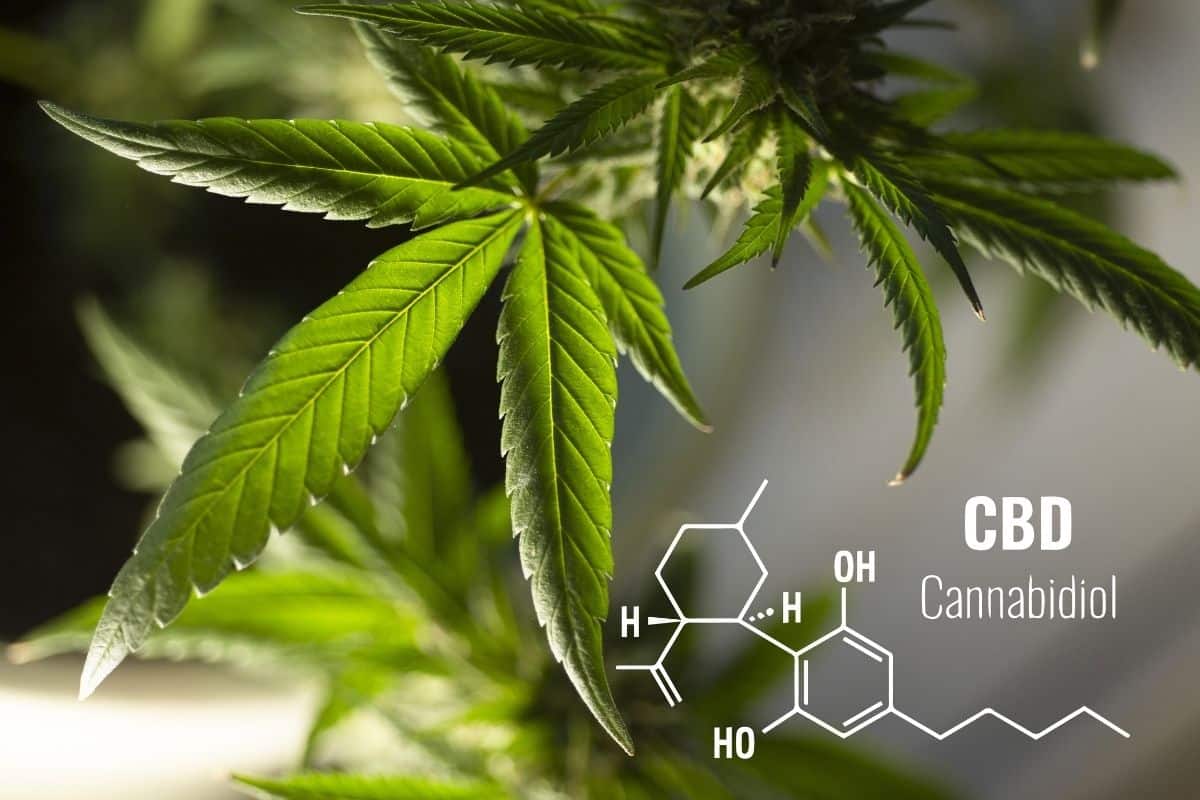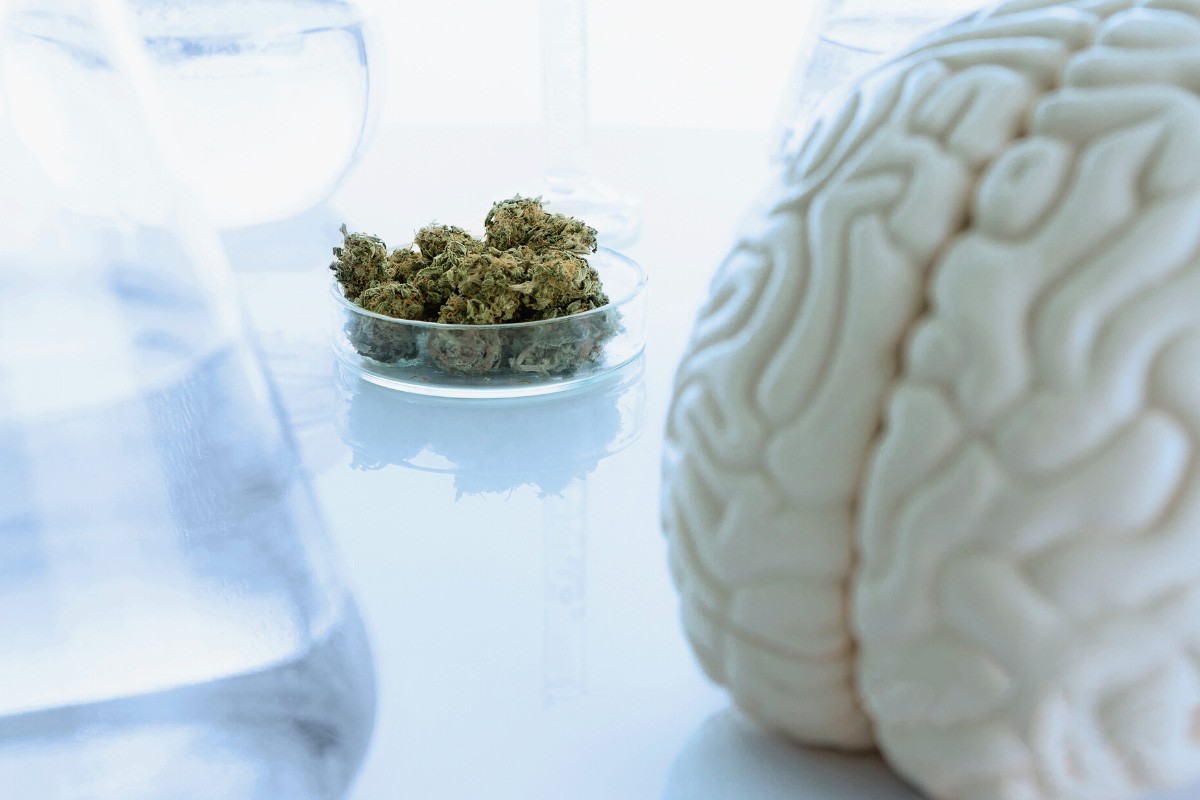Cannabidiol, better known by its abbreviation CBD, belongs to the so-called cannabinoids. In this case, we are talking about phytocannabinoids, plant-based active ingredients, as opposed to endocannabinoids, which are found in the human body. Phytocannabinoids such as CBD are produced naturally in the cannabis plant or are processed through oxidation when the plant material is heated, making their effects useful to humans. Cannabinoids can act in very different ways. Most well-known is THC, which is responsible for the intoxicating effect of cannabis. Unlike THC, however, cannabidiol does not have a psychoactive effect, i.e. it does not produce a euphoric high or a state of intoxication. Instead, cannabidiol (often dissolved in CBD oil) is said to have many other effects that can have a positive effect on health and/or well-being. Some of these effects have already been shown in animal or human studies. For others, scientific evidence is still pending. Below you will learn more about the most commonly mentioned effects and applications of CBD, as well as a brief overview of typical CBD formulations for medical uses.
Effects by administration: CBD as oil, flowers and other formulations
As with THC, there are different dosage forms for CBD, which may also differ in their local effects on the human body.
Effects of CBD oils and CBD drops
CBD oil is taken orally, like CBD drops, where it should be absorbed into the oral mucosa for about 60 seconds. The advantage with the effects of CBD oil is that its recipes are very easy to use and no further medical equipment is needed to extract or oxidize the CBD from the cannabis plant for proper dosage, as is the case with the conversion of cannabidiolic acid (CBDA) in cannabidiol-potent flowers for medical vaporization. [1]
CBD capsules and their effects
For medicinal benefits and a corresponding effect, CBD capsules are one of the most useful and proven forms to reliably dose the active ingredient. [2]
Meanwhile, if capsules are taken together with, for example, hemp oil or similar fats, the so-called bioavailability may increase when absorbed through the gastric mucosa, so that the drug could better develop its effect of CBD. [3]
Effects of CBD flowers
The use of CBD oil is not always suitable for every form of therapy. If a pain-relieving or symptom-inhibiting effect of cannabidiol is to begin quickly, inhalation is one of the most effective ways to absorb the active ingredients. However, when inhaling, care must also be taken to choose a gentle method that does not expose the lungs to excessive heat, even during vaporization. [4]
A consistent dosage is more difficult to achieve here compared to the other forms of application, but may be useful for patients with acute therapeutic needs. Thus, the effect of CBD is, with this method, the quickest to achieve.
CBD gel and CBD creams: how does CBD cosmetics work?
Especially in cosmetics, the effect of CBD in creams and masks is experiencing a trend. CBD gels can also play an important role in medical applications. Since the CBD solution is absorbed through the skin, i.e. transdermally, this is more about a local or external effect.
How fast and how long does CBD take effect?
CBD oil takes effect after about 15 – 60 minutes (depending on body type). This is especially true when CBD oil is taken through the oral mucous membranes. If it is taken with food or swallowed directly, it may take longer to absorb. The effect of the cannabidiol oil then lasts for about 4 – 6 hours. [4]
When CBD is inhaled directly through heated flowers, the absorption of the active ingredient basically occurs directly through the bloodstream and the effect on the body starts a few seconds or minutes afterwards. The duration of action is estimated to be approximately 2 – 4 hours when vaporized.
CBD capsules release their active ingredient after about 30 – 90 minutes and then maintain their effect for about 6 – 8 hours. [4]
It is likely that prolonged use of the same dose will result in a longer duration of CBD effects. In general, it is recommended to take CBD products two to three times a day. [5]
However, this always also depends on the therapy concept and the individually agreed arrangements with the treating physician, as he or she will assess certain pre-existing conditions and interactions with other medications.
These factors can influence the effectiveness of CBD
The intake of CBD oil and other formulations, especially in high-dose form, should always be done only in conjunction with medical supervision, as these are prescription marijuana recipes. During such a medical screening, the physician then checks following factors as
- the patient’s age and previous medical conditions,
- the type, duration and intensity of the symptoms,
- body weight and physical condition
- genetic predispositions and use of other medications,
- the influence of environmental factors (e.g. psychosocial stress).
From these factors and the above pharmacokinetic parameters of the particular dosage form being considered for therapy, the physician can then derive the dose of CBD oil or other preparation and thus optimally tailor the effect to the needs of the patient. By considering the entourage effect, there could also be opportunities in the combined treatment with CBD and THC. In pain therapy, these therapeutic options have already proven their worth. But what exactly is the reason for this?
How CBD works for different diseases
Depending on the patient’s disease, the doctor decides on different dosages and dosage forms, such as CBD oil and high-dose preparations, which can be combined with THC for therapy. This is true, for example, for its effectiveness in chronic pain. However, many other forms of treatment and diseases also benefit from the effects of CBD oils, capsules and individually dosed CBD preparations.
Physical Pain: Study evidence of efficacy of CBD formulations
Cannabis has been used for centuries around the world to relieve pain. However, it is not so clear which components of the plant are responsible for the pain-relieving effect. It is now known that the active ingredients (cannabinoids), which would then be dissolved in an oil, for example, dock onto special receptors that belong to the body’s so-called endocannabinoid system. This system is involved in many different bodily functions such as appetite, sleep, immune function and pain perception.
Studies have shown that cannabidiol in combination with the THC of marijuana appears to affect the activity of endocannabinoid receptors, thereby having anti-inflammatory and analgesic effects [6]. Although most studies examined the combination of THC and CBD, cannabidiol oil or other preparations alone also appear to be good for pain, especially nerve and back pain [7].
A drug called Sativex, which contains a combination of THC and CBD as the active ingredient, is approved in several countries for the treatment of pain and spasms in multiple sclerosis (MS). Studies have confirmed that the drug combination can attenuate MS symptoms and reduce pain intensity [8]. However, further studies are needed to draw definitive conclusions [9]. Instead of oil, a cannabis medication is an oral spray made from cannabis extracts.
In addition, there are studies with fibromyalgia patients and individuals suffering from other chronic pain. These too have been able to report a noticeable improvement in their symptoms after taking cannabidiol for pain relief [10].
CBD efficacy for neurological disorders
Some researchers believe that the ability of CBD oil and other medicinal CBD preparations to influence the endocannabinoid system may be beneficial in neurological disorders. In fact, the use of CBD in neurological disorders such as epilepsy or multiple sclerosis (MS) is very well studied. Studies show very good success of CBD and THC in the treatment of muscle spasticity in MS patients who have not responded to other medications [11].
In addition, the effects of CBD also appear to significantly reduce the number of disease-related seizures in treatment-resistant patients with severe epilepsy, both in children and adolescents as well as in young adults [12, 13].
Some studies suggest that cannabidiol may improve quality of life and sleep for individuals suffering from Parkinson’s disease [14], but there is still insufficient data to make an informed assessment of the efficacy of CBD oil and the dosage forms listed above in Parkinson’s disease.
Mental disorders: How does CBD affect the brain?
Above a certain dosage, the effect of CBD seems to have an anxiety-relieving effect [15], which may also be important for the treatment of anxiety disorders. Due to the continuous symptomatology, the dosage forms tend to focus on the intake of capsules and CBD oil, which does not mean that other forms would not also be effective. To date, there is already some promising evidence from animal and human studies that CBD can have a positive effect on anxiety, depressive symptoms, and other mental health issues [16]. For example, studies have shown that cannabidiol can reduce symptoms of post-traumatic stress disorder (such as anxiety, insomnia, or nightmares) in children [17] and adults [18]. However, there is still a great need for research in this area, and scientists are particularly interested in whether and how the effects of CBD can be used to support the treatment of other mental disorders (e.g. depression or bipolar disorder).
Heart health: pulsatile efficacy of CBD
Cannabidiol appears to have a positive effect on heart health, specifically blood pressure, which is an important factor in the health of the organ. For example, one study showed that even a single dose of CBD could lower resting blood pressure in healthy men compared to a placebo [19]. In another study, several days of treatment also significantly lowered blood pressure and improved blood flow through the arteries [20].
Other uses of CBD
In addition, there are numerous other studies and reports on other possible applications and positive effects of CBD. For example, the cannabinoid can apparently also alleviate cancer-related pain and mitigate some of the massive side effects of drug treatments (chemotherapy) [21]. Another major application of CBD is the treatment of sleep problems. Here too, there are some scientific studies and many testimonials from sufferers who report positive effects of CBD on sleep disorders [22]. Also discussed are possible effects of CBD on the immune system or for the treatment of irritable bowel syndrome.
By the way: There are indications that dosage forms such as CBD oil can not only do people good, but can also alleviate various complaints in animals, especially in dogs, cats and horses.








